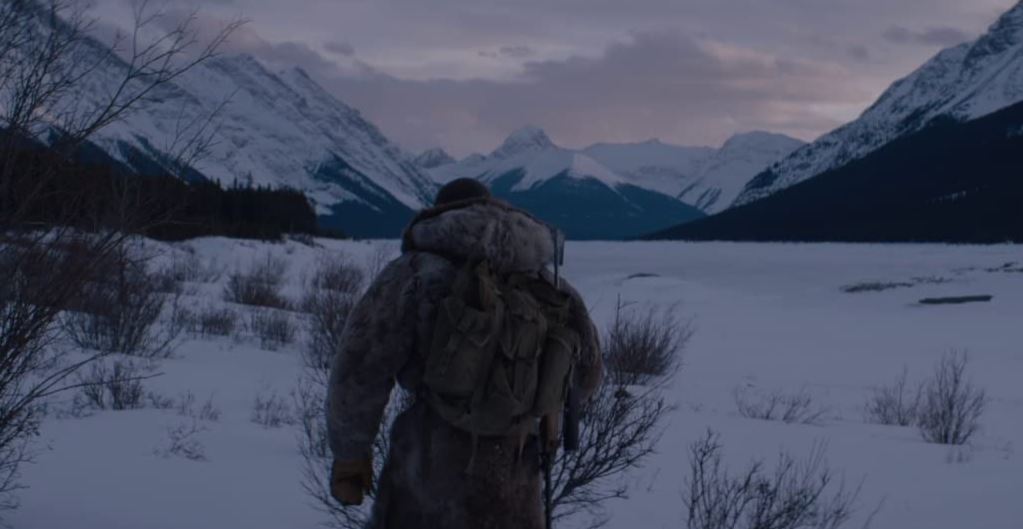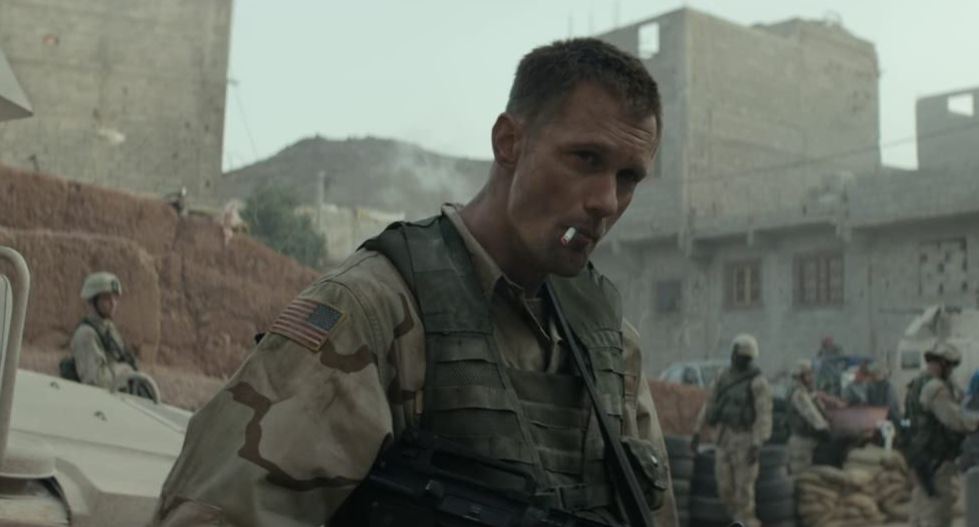With Hold the Dark, Jeremy Saulnier’s third such endeavor and fourth feature, the director’s reputation as a state-hopping connoisseur of America’s backwoods is well and truly confirmed. A reputation not so much for achievement as inclination; mainly an infatuation with subcultures situated at the peripheries of mainstream society. His penchant for uncompromising and violent depictions of societal offshoots has formed an anthropologic lens coloring an entire oeuvre barring a quirky debut, perhaps, at thematic odds with subsequent preoccupations.
In Blue Ruin we were treated to a longstanding vendetta between a degenerate and a clan of hicks in Maryland. In Green Room we saw neo-nazis lay siege to a punk band in Oregon’s timberland. Hold the Dark takes us to the Alaskan bush, where cops, natives, and whites now converge. Throw in some occultism and an unwitting and transplant black man, and you have enough material to concoct a comedy.
The film is no laughing matter. Despite a meandering journey toward anything resembling an assured focus, it is not for the most absent-minded, and I did fall victim to inattention. But there is enough to salvage for the attentive viewer. The horror in his previous films stands in homage to the genre’s tradition of invading the familiar, despite foregoing hidden subtext and imbued meanings in character archetypes. For that, they feel…shall I say?…bipartisan as their depictions neither condemn nor condone despite a clear distinction between hero and villain.

Arguably his most muted work to date, Dark also sees Saulnier at his most introspective, as he turns his gaze at his fellow citizen further inward, if one is to safely assume principal characters serve as authorial surrogates. Here, an American Frontier setting makes way for the Last Frontier in what is perhaps indicative of a closing statement by the director. You know, lest another entry into the same thematic realm plunge his work into parodic territory. Jeffrey Wright plays Russell Core, a Juneau-based writer lured to the bush by virtue of a specialty studying wolves’ behavior.
Enlisted by the mother (Keough) of a local boy to hunt the wolf pack that presumably snatched him into the forest, the latest in the village to suffer such fate, Wright plays his part with a subdued stoicism and a firmly held restraint amid his growing disbelief of the official story. When the body is discovered in the basement, however, and the woman flees, the charade leads to a descent into mysticism.
Of course all this is not before the preliminary dose of foreshadowing of that occultism. On his first night over (this is a remote village) Medora strips off in the bathroom, dons a wolf mask, snuggles next to the sleeping Core on the couch, then mimes being choked with his hand. Meanwhile her husband Vernon (Skarsgard) is in Iraq, unaware of both son and wife, and his travails are shown in a jarring wartime sequence that is the reverse in temperature, color palette and sexual permissiveness.
While his wife lies down next to a stranger, he shoots a comrade raping a local woman then gets shot by hostiles upon stepping out. Incidentally he is shot in the neck. Shockingly, the juxtaposition of both extremes fails to radiate. And in a shocking turn, Dark does not titillate outside of a grueling shootout between the police and Vernon’s native accomplice, Cheeon (Black Antelope). It’s drawn out to an agonizing extreme meant to punish and elicit trauma in the viewer. Except that with its third disturbing reveal going unnoticed, it dampens the sum of all parts while reducing the shooting to a pompous choreography for its carnage.

Dark is also Saulnier’s most elusive. A thick philosophical undertone obscures direct interpretation. It turns out the kid was the product of incest between two siblings and whatever darkness the wolves conjure might just be primitive beliefs recoiling in indignation. It was ultimately a hocus-pocus reaction to forbidden relations—an implication made in passing and under the guise of early exposition that can easily be chalked to the dearth of suitors in a small-town setting. A later confirmation resurfaces that’s now just reward solely for whomever picked up on the earlier hint.
On top, the inclusion of the Iraq War casts the shootout under a different light. In spite of the temporary and clashing visuals, it’s easy to see directorial intent for an anti-war sentiment; how the conflict within discredits the one waged halfway across the globe. While ignoring the plight of remote communities, their underdeveloped infrastructure, etc., one is unsure whether the centerpiece bloodbath is a grievance equating negligence to a form of terrorism; the true, new face of a long-dormant expansionism.
One could also see that outburst as a final protest against post-colonialism and a way to combat administrative terrorism with real terrorism. Again, there is ample comedic implication from today’s climate in that Core, a black man, in the Alaskan bush, finds himself in the literal and administrative crossfire of the continuing clash between the white man and the native man and comes out unscathed and surely bemused to no end.